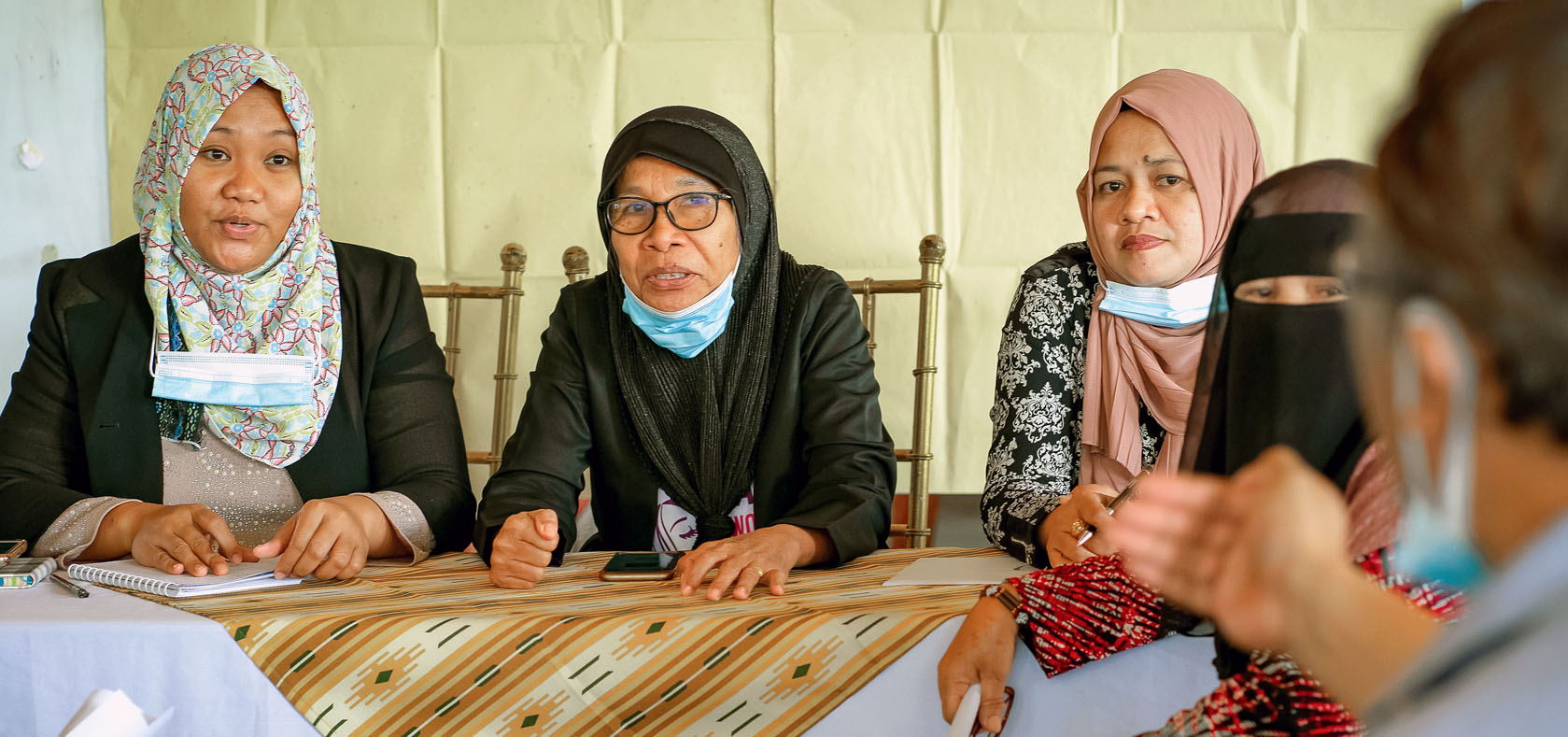Women’s groups relieve conflicts in fragile communities in the Philippines’ Bangsamoro region
Date:
Author: Maricel Aguilar

Manila, the Philippines — Aileen Hualde considers it her duty to help resolve conflict. She and other female volunteers created the Community Quick Response Team in South Upi, in the Bangsamoro Autonomous Region of Muslim Mindanao, first to help stem the COVID-19 pandemic there. Then the team worked with the local government to help almost 600 people displaced by communal conflict while giving priority to the needs of women and girls.
The team has one member in each of South Upi’s 11 barangays (villages). The women receive early information about armed clashes, alert the local authorities, and are among the first responders in conflict areas.
UN Women is supporting women’s groups in South Upi municipality of Maguindinao province and in North Cotabato province under the United Nations Secretary-General’s Peacebuilding Fund Phase 3 project: Promoting Conflict Prevention, Social Cohesion and Community Resilience in BARMM in the Time of COVID-19. The initiative has shown how women are crucial in preventing divisions and conflicts in fragile communities. BARMM is Bangsamoro Autonomous Region of Muslim Mindanao, formed in 2019 after decades of armed conflict.
Even though their work is so important, some members of the South Upi team said they faced difficulties in getting support from their families. The women are still expected to do the household chores and care work and in some cases, they have to get their spouse’s permission to do the community work.
Last October, UN Women started efforts to strengthen the team by organizing group discussions in which family members learned to appreciate the value of the women’s efforts and the need to share the household work so that the women could do the community conflict work. Afterwards, some family members even said they now wanted to work side-by-side with the women in humanitarian response.
UN Women also did a training on analyzing conflict with a gender lens. Members of the South Upi women’s team, the municipal government and the Philippine National Police attended. They learned the value of data gathering and gender analysis to be used for gender-responsive preparedness planning. But they also learned that it is crucial to prevent conflict, not just to respond and provide relief after it occurs. The women’s team realized that it needed to do advocacy and community trainings on preventing gender-based violence; set early warning systems and report potential conflict trigger events; and push for dialogues or “hybrid” legal measures to resolve land and other conflicts.
Historically, most of South Upi’s conflicts have involved land disputes that arise from the tensions between formal and customary laws over land and property in indigenous communities. Gender-based violence is an early warning sign, not just a result of these disputes.
In North Cotabato, in 2020 Connie Dumato and other women formed Tupo na Tao sa Laya-Women; the group organized mediation, speaking with parties, facilitating agreements, and ensuring that conflicting parties adhered to agreements. Mediation in the region is often led by men and done outside of formal mechanisms The men noticed the women’s skills and appointed them as interim mediators.
The women’s group dealt with complex conflicts like rido (clan feuds), murder and land disputes. They needed more skills in order to more effectively mediate and to gain greater credibility from conflicting parties.
A UN Women training last October helped the women’s group learn skills in conflict analysis, dialogue and mediation.
“The simulations were useful as we apply our knowledge and skills in actual situations. Feedback from these simulations helped us see our strengths and areas for improvement,” said one of the participants, Prof. Khadiguia Ontok-Balah.
After the training, the women’s group applied their skills in facilitating dialogue in their communities. The women sought to understand the contexts of conflict in the barangays so that they can better prevent and resolve them. They hope that their participation in these community dialogues will persuade local peace and order councils to recognize their skills and accept them as partners in formal conflict resolution processes and mechanisms.